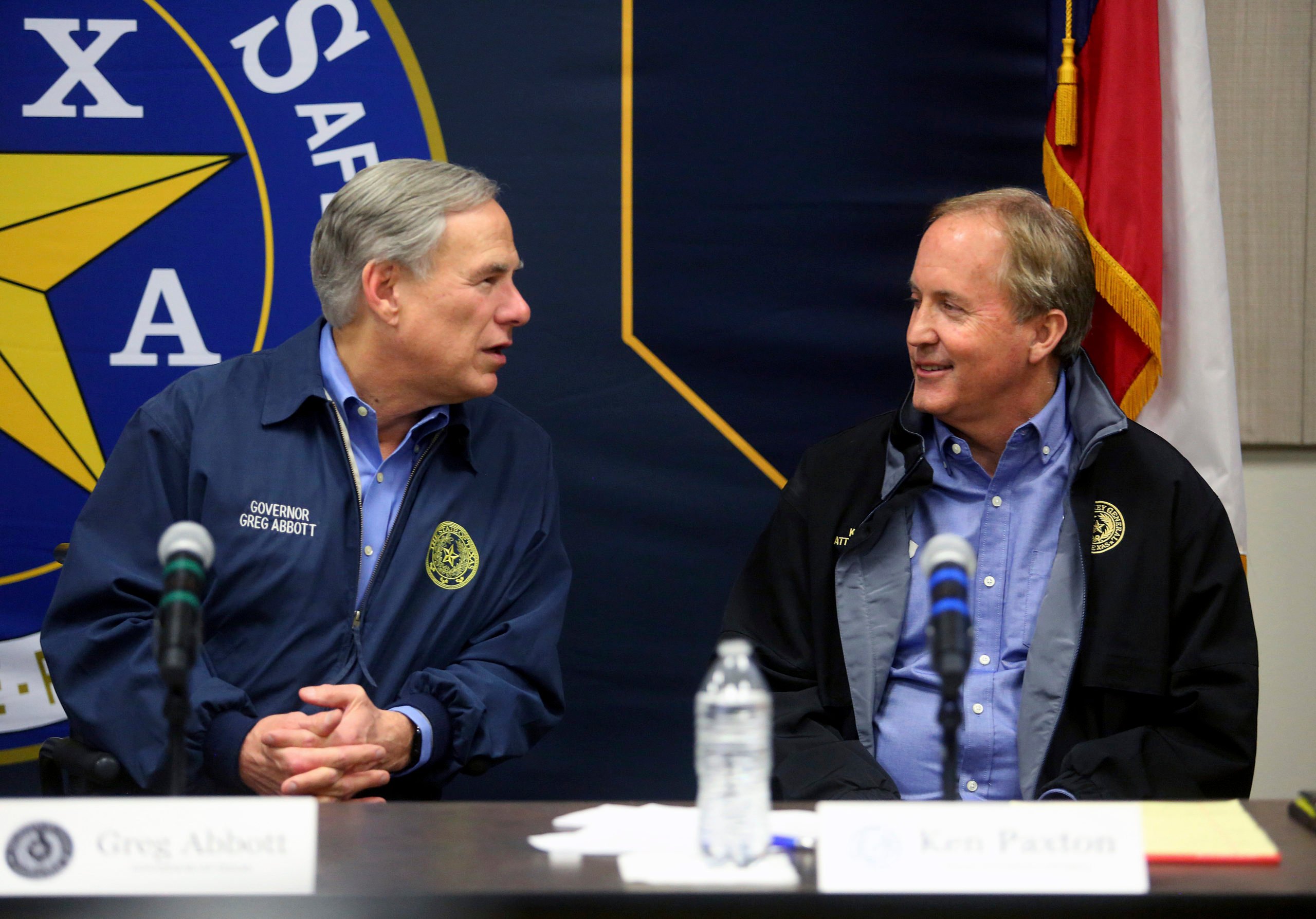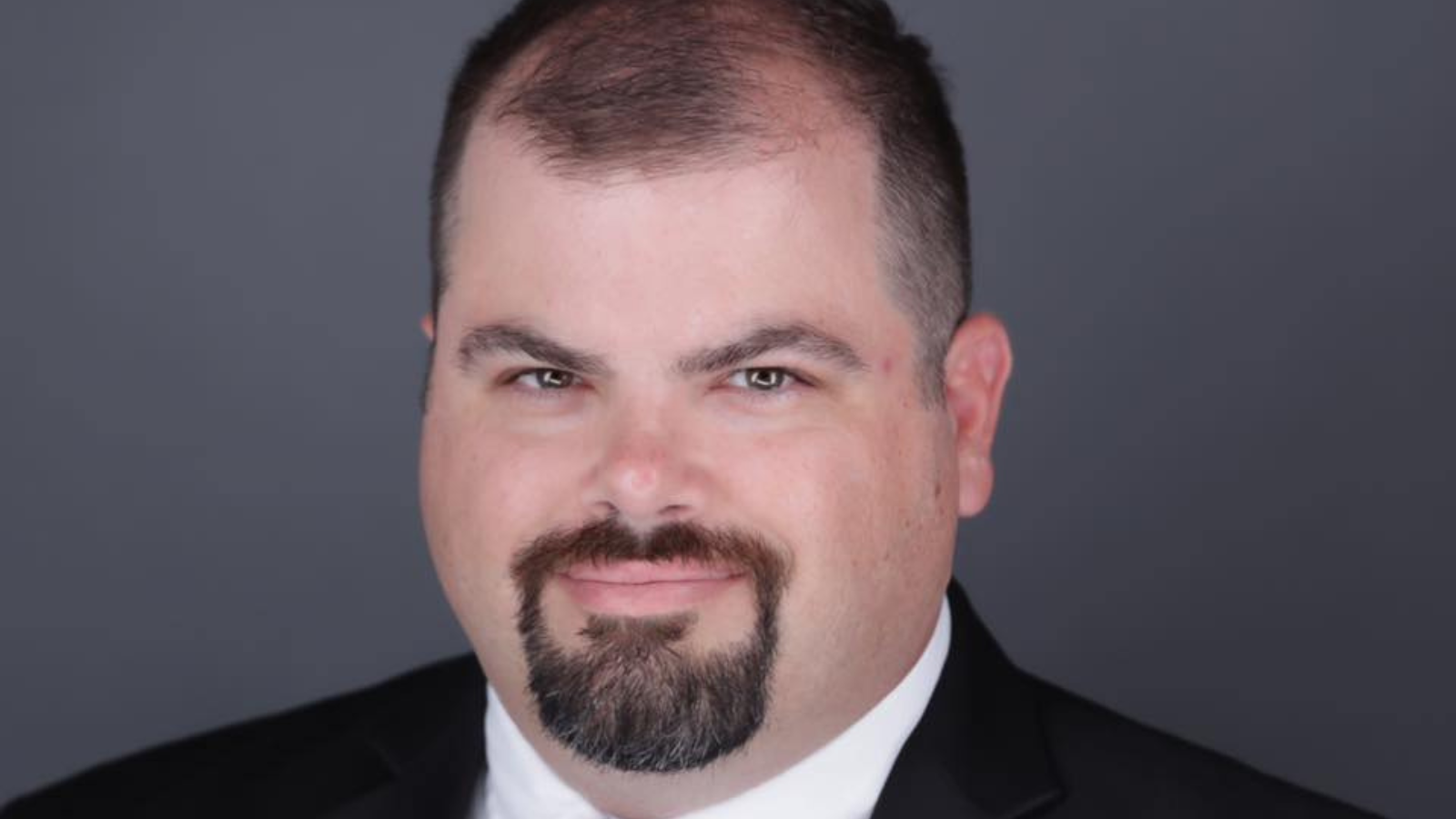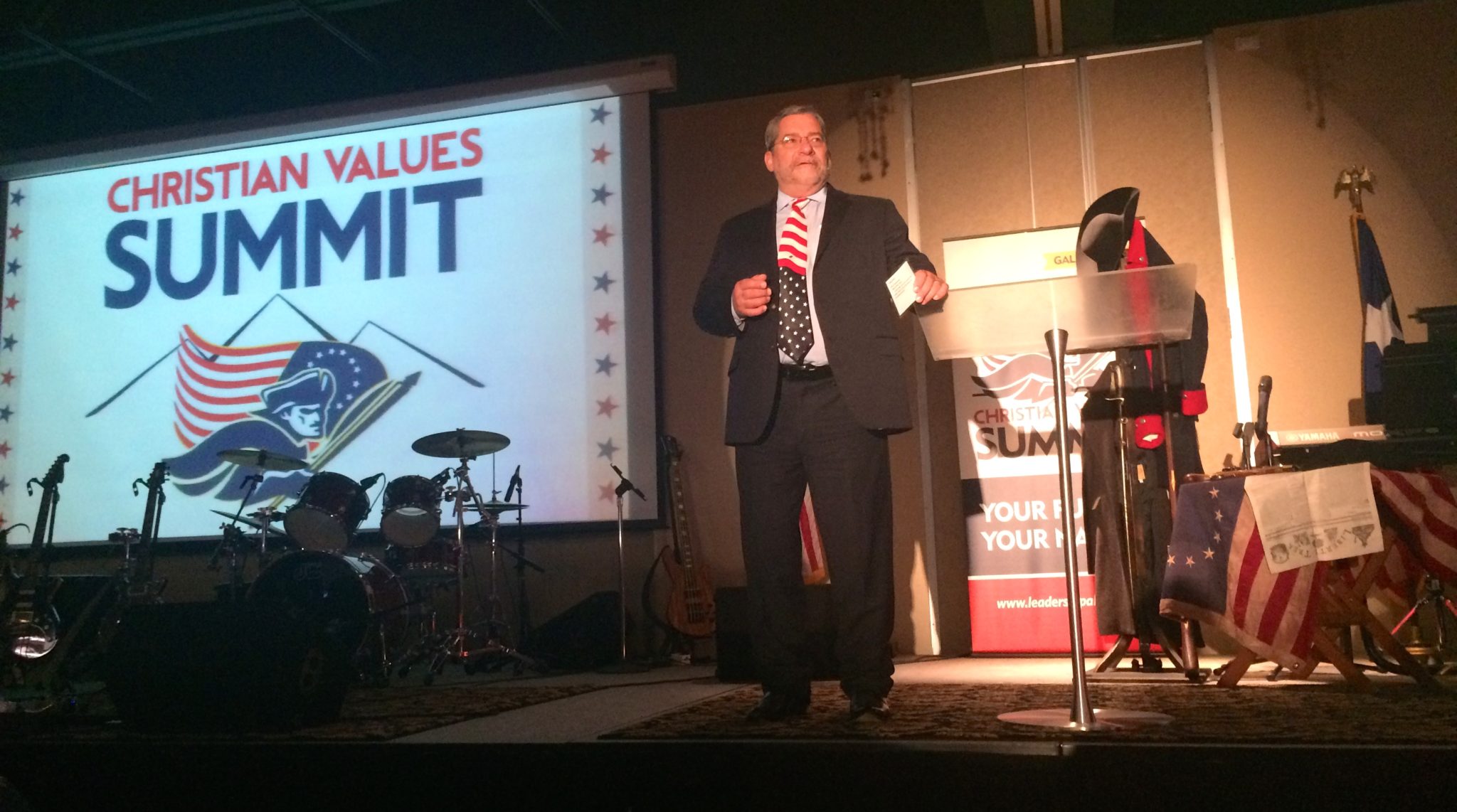
Minding the Flock
In Granbury, evangelical leaders rally the faithful with talk of Hitler, slavery, sodomy and voter turnout.

Above: Event organizer Jerry Maston, senior pastor of Eastland County's River of Life Church, addresses the crowd in between speakers, in front of an array of revolutionary war props.
On Friday, at the second annual Christian Values Summit, some 200 evangelicals met in the Granbury Resort Conference Center to consider America’s precipitous moral decline. Could the nation be saved? As jet-skiers paraded on Lake Granbury just outside the conference room, the little congregation sat in soporific air conditioning to get a sense of what needed to be done. An army of speakers appeared one by one on stage to deliver a message: Things could be all right again. Like Tinkerbell, the light of the American project was growing dim before our eyes, but it could still be revived. All you have to do is believe.
Evangelicals hold a lot of sway in American politics, but they’re not an interest group simply seeking to protect their interests. Theirs is a totalizing vision for government and society, one that can never be fully realized. Evangelicals have won some significant battles in the political arena over the years, but they’re bitterly aware that the half-century since the social revolutions of the 1960s has pushed them farther away from the kind of world they seek.
The men and women who spoke at the Friday rally didn’t sugarcoat that. At the summit — free to attend for the faithful, though closed to the press — they could speak openly and forthrightly about the movement’s enemies, foreign and domestic. But they also sought to convince their audience it wasn’t too late to turn things around, with the aid of slogans, inspirational stories, lectures and merchandise.
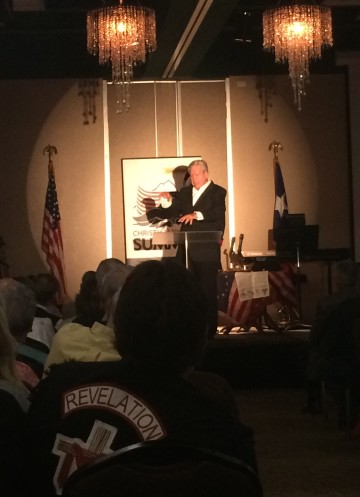
There was Doug Jeffrey, a former Air Force pilot who began his lecture with a slide of a yellow sky in West Texas. “Is the sun rising or setting?” the slideshow asked, followed by photos of veterans with smiling children. Jeffrey talked about flying a transport plane with the remains of American soldiers back from Baghdad. That’s the best of America, he said. “Then you have this joke,” he says, forwarding his slideshow to a Department of Defense-sanctioned poster, emblazoned with a rainbow, promoting the military’s Pride Month 2015. During his last tour of duty, the military’s “Don’t Ask, Don’t Tell” policy had been repealed, he said, and his superiors began including “LGBT facts” in emails. It angered him to no end.
Did not Isaiah 54:17 tell us that “no weapon formed against” the Lord “shall prosper”? asked Jeffrey. Our own heathenry prevents us from waging righteous war against our adversaries, he suggested. Jeffrey shocked the crowd by revealing the existence of a Wiccan Circle at the Air Force Academy in Colorado Springs. Perhaps the sun was setting after all. Oscars-style hurry-up music ushered Jeffrey off the stage before the question could be adequately resolved.
And there was Bob McEwen, a former congressman from Ohio who lost his seat after it came out that he’d bounced 166 checks from a government-run bank. He now travels the country extolling fiscal conservatism.
“Only two people can take money from you,” he told the crowd: a criminal and a tax collector. The effect, he said, “is the same.” The more money taken from you, the more of a slave you are. The more money you have, the more freedom you have. “Greater freedom equals greater wealth, and greater government equals greater poverty,” he said. “It only works this way.” Having explained why Sweden is awash in human misery and Somalia a paradise, he moved on to more concrete examples.
“This is what Nagasaki looked like at the end of World War II,” he said, pointing to a picture of the devastation left by Fat Man. “Then they were taught by the American people that freedom is better. This is Nagasaki today,” he said, pointing again to a picture of waterfront skyscrapers. Many in the crowd murmured approvingly.
Any political ideology or sentiment that valued a group over the individual came straight from the mouth of the Father of Lies. Why did the American Revolution succeed while its Gallic equivalent failed, for example? “What was the theme of the French Revolution? Liberty, equality, fraternity,” he said. “What’s another name for fraternity? Group. What’s another name for group? Soviet. What’s another name for Soviet? Union.”
Dorothy Burton, an African-American woman from Dallas, told the crowd about the “seven mountains of society,” the commanding heights of business, politics, media, etc., that the godly needed to occupy to take back the country. “We have ungodly people making decisions for godly people and expecting us to be satisfied,” she said. She gently told the crowd that “Barack Hussein Obama” was not a Muslim —“don’t throw shoes at me, now,” she said. He was worse: He was a congregationalist. Liberal Christianity is as much of an enemy, she said, as the unbelievers are.
She played a video produced by the United Church of Christ, the denomination to which Obama belongs, extolling the church’s tradition of social activism. Congregationalists had opposed slavery and apartheid, provided social services for freed blacks and the poor, and supported rights for women, ethnic minorities, the disabled and gay people. “The UCC is running this country,” Burton said, to a scattering of dismayed noises in the audience. The congregationalists are a major source of the permissive and collectivist poison running through America’s veins, Barton sought to impress upon the crowd.
After Burton came Dexter Sanders, a young African-American preacher from Orlando, who slowly brought the older crowd up to his shouty energy level. With his hip “Back 2 God” movement, he aimed to speak to America’s youth, he told his audience. America had made some mistakes, he said, but God had blessed this nation.
“Yeah, we got a little bit off track with that slavery thing, didn’t we?” he said. “But as soon as we got off track a little bit God put us back on track, didn’t he? Let’s clap for that.” Then he segued to the main part of his lecture, a discussion of Cleon Skousen’s 1958 book The Naked Communist. (Nobody speaks to the millennial heart better than Skousen, the flinty John Birch Society stalwart and Mormon conspiracy theorist who taught that slavery was a “blessing” and rose to prominence again a few years ago thanks to Glenn Beck.)
There was a bevy of other speakers. Houston pastor Dr. Lawrence White gave an extended sermon about the similarities between modern America and Weimar Germany, positing that the nation’s acceptance of legal abortion makes “Hitler look like a humanitarian.” Another speaker suggested that the soil problems of the National Mall were a God-sent plague, foretold in Psalms. Another recalled the story of a much-needed rainstorm that let loose its load over Texas the day Gov. Perry signed a package of abortion restrictions in 2013.
But nobody at the Granbury summit could hold a candle to Oklahoma state Rep. Dan Fisher, author of the two-volume Bringing Back the Black Robed Regiment. As he was introduced, the lights were dimmed. A scene from The Patriot, a 2000 Mel Gibson movie about the American Revolution, began to play. In the clip, Heath Ledger barges into a church service, asking for volunteers to fight the British. He’s rebuked by the pastor at first, but a passionate speech from Ledger’s love interest convinces the men, who one by one stand to take arms.
As the music swells—and the pastor decides to join the fight too—Fisher starts to walk down the conference hall’s middle aisle, with a musket slung over his shoulder, wearing heavy, period-appropriate church robes. The movie clip ends, and the spotlight hits Fisher on stage. He is Peter Muhlenberg, a hero of the revolution and Lutheran clergyman. He has traveled through time to be in Granbury—he makes asides that express his astonishment at things “in your time”—to tell us of the preachers who fought the British, and to urge us to fight for righteousness in 2015.
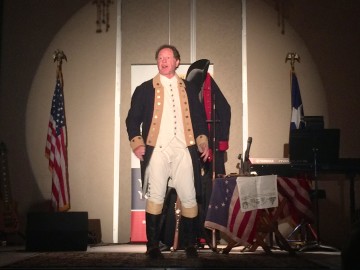
As Muhlenberg/Fisher speaks of his decision to take up arms, he casts aside his pastor’s robes. Underneath is the uniform of a Revolutionary War colonel. Now he speaks of those who gave their life to the cause of fighting the British, and of those who enjoyed post-war glory. He speaks of pastors who wore pistols during their sermons, for fear of assassins—and he shows us the pistols. He discards this uniform too, and underneath is the dress of an 18th-century civilian. He is aflame with passion. If God’s representatives on earth could give their lives for the spirit of 1776, couldn’t their descendents “just stand up?”
It’s as unusual a display as you will see at a political rally, but it raises the question: What exactly do the speakers want from this crowd? They want them to vote, sure, but the people who took time to come to this conference surely vote already. Channeling the state’s mournful Democrats, the Christian right leaders tell their base everything would be different if 100 percent of evangelicals voted. But how could these people be louder? More vocal? In 1776, there was a war to fight at home, and the enemy was easily identifiable. Anyone who’s seen a Hollywood movie knows the villains are always the ones with the British accents. It’s easy to understand why Fisher loves live action role-playing as Pastor Muhlenberg: Wouldn’t it be lovely to know your destiny, and what is to be done, and then to win?
But now, in 2015, external and internal enemies abound, and few can be dispatched with lethal violence. The Devil’s even knocking on little Granbury’s door, in the form of “transvestic behavior.” Everything is messier. Americans are more ethnically and spiritually diverse than ever before, and the government arguably accountable to more of its citizens than ever before. The old pathways to success for the Christian right may be blocked. In Granbury, the speakers had little to offer in the way of solutions.
Before the righteous were ushered back into the disintegrating world, Jerry Maston, the Eastland County preacher who organized the event, urged the crowd to scan the tables of merchandise. “There is a lot of product that we want to get into your hands,” he said. Buy something to “help support the ministry.”
Evangelicals will play an outsized role in next year’s presidential GOP primary, where many candidates are angling for the evangelical vote. They’ll remain a bedrock of Republican politics. But as the country continues to edge cautiously toward secularism and tolerance, and as many young Republicans tilt in a more libertarian direction on social issues, it’s tempting to declare: For y’all, the sun is setting.

